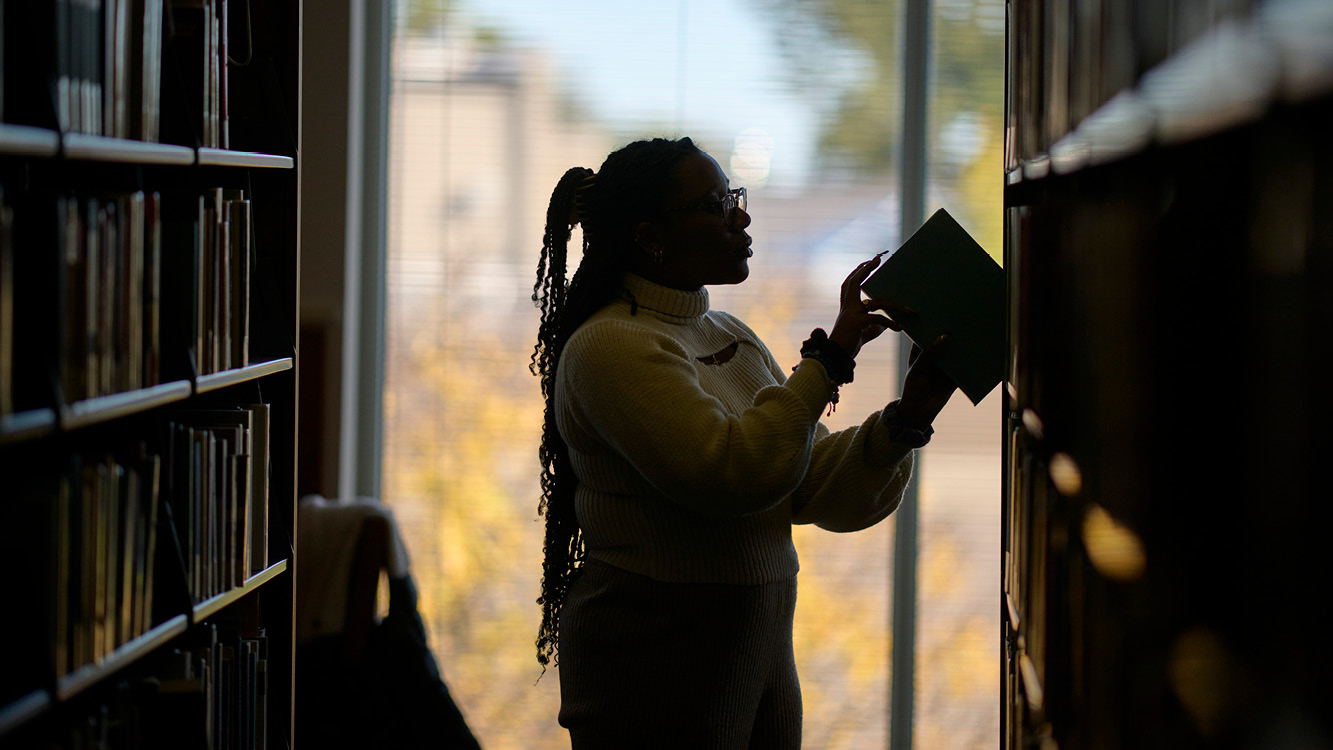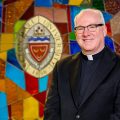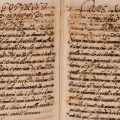A new set of interdisciplinary programs marries the humanities with professional and technical coursework to better prepare Seton Hall students for their careers.
They might at first appear to be an odd pairing for such an ambitious initiative. Elizabeth McCrea is an associate professor of management in Seton Hall’s Stillman School of Business. Abe Zakhem is a professor of philosophy in the College of Arts and Sciences. A few years back, they started to think about how they might create a new minor that would meld the study of humanities with the study of business, two disciplines that traditionally have been considered distinctly separate endeavors. And that was precisely the point.
McCrea and Zakhem were convinced — tradition be damned — that business students could benefit from studying the humanities just as much as humanities students could benefit from studying business. With the help of two grants from the National Endowment for the Humanities, they set out to compile just such an interdisciplinary curriculum. The result is Seton Hall’s new minor in Business Humanities, an 18-credit program that debuted in the fall.
For McCrea, the notion that business and the humanities are inexorably intertwined represents a commonsense reality. “Today,” she says, “problems are really difficult, complex, pervasive. Unless you’ve got empathy and imagination, unless you’re very inclusive and culturally astute, it’s going to be difficult to enact change, difficult to grow a business. With the humanities, if you are delving into the human condition, you can devise solutions that are more likely to be successful, because you’ve got the human aspect incorporated into the solution.”
Zakhem believes the humanities have long been an integral part of the professional world. “The humanities and those who work in the humanities have always and continue to have a lot to say about business and medicine and other things we take to be professions,” he says. “We ask all kinds of questions about business, about values, aesthetics. We have all sorts of interesting things to say about business.”
The introduction of the Business Humanities minor, open to students of any major, is part of Seton Hall’s broader effort to incorporate the humanities into a wide array of disciplines. Since 2019, the University has offered a minor in Medical Humanities, designed to help aspiring doctors, nurses, physical therapists and scientists take a more holistic approach by honing their ability to listen closely, communicate compassionately, and consider socioeconomic and cultural differences when interacting with patients. Students are taught to understand the different ways that people experience life, sickness and death, so they may deliver more compassionate and effective health care.
Earlier this year, the College of Arts and Sciences hired Aleksy Tarasenko-Struc, a bioethicist specializing in moral and social philosophy, to lead the Medical Humanities program. Tarasenko-Struc, who earned his doctorate in philosophy from Harvard University, says part of his mission is helping students overcome the misperception that medicine is a purely technical or scientific field. “In our view,” he says, “what’s left out by that conception of medicine is the interpersonal or social dimension of clinical practice. That requires empathy, imagination — a whole different skill set — and that’s what we try to instill. How we do that is by offering students a range of courses in different fields across the humanities and social sciences.”
As an example, he cites healthcare workers — faced with assessing the needs of patients with a disability — who may have not learned to consider the patient’s perspective. “When you actually ask people with disabilities,” Tarasenko-Struc says, “in many cases they’ll say, ‘I’m doing pretty well. I don’t resent the fact that I’m disabled. In fact, if I could take a pill to make my disability go away, I wouldn’t do it. It’s part of my identity.’ That kind of engagement with narrative is really important for somebody who’s taking care of patients with disabilities.”
The 18-credit Medical Humanities program brings together fields in the humanities, social sciences and the arts, offering courses such as Modern Society and Human Happiness, Illness and Literature, Christian Values and Health Issues, and Biomedical Ethics, taught by Tarasenko-Struc, who aims to get students thinking about the “moral texture” of clinical practice. “What unites the students in the program,” Tarasenko-Struc says, “is a shared sense of the importance of the holistic and humanistic aspects of patient care.”
The lessons are particularly meaningful for undergraduates, he says. “Students at this stage are very open-minded. The same is true of early medical students. As you get initiated into the field of medicine, and start learning the norms, it becomes a bit harder to remain as open minded and to really take a critical look into the practices they’re engaging in.”
Jonathan Farina, a professor of English and the interim dean of the College of Arts and Sciences, has played a leading role in Seton Hall’s push to integrate the humanities into curricula campus-wide. He prefers the term “applied humanities,” emphasizing the importance of narrative storytelling across professions, whether that means pitching an idea to Amazon, listening to patients talk about their symptoms, or describing the importance of a scientific research project for a grant proposal.
“All the tech companies want students who can write well,” he says. “I want programs to have courses that teach the subjects that students are going to encounter in the real world, so that when they have a job interview, they can talk about how their history minor enables them to be more thoughtful and effective at their specific profession.”
Seton Hall’s new minor in Business Humanities will produce students better equipped to enter the workforce, Farina says. While the liberal arts have taken for granted that students can figure out how to apply history, literature, philosophy and other humanities studies to their profession, the courses in the integrated programs will teach students how to make those applications and, yes, to discuss them at their job interviews.
The same applies to the highly valued technical skills and roles. In another Seton Hall interdisciplinary program leading to an undergraduate certificate in Digital Humanities and Data Studies, students learn skills from website design to data mining and geospatial analysis. While some courses focus on computing and statistics, the program also offers courses such as Contemporary U.S. Public Policy, Introduction to Linguistic Anthropology and City in American Literature.
Professors Zakhem and McCrea received their first NEH grant for the Business Humanities program in 2019, then a second one three years later. In their second grant proposal, Zakhem and McCrea emphasized the importance of a cross-discipline education. The grants, totaling $185,000, were used in part for a symposium on business humanities held on campus in October 2023.
And now the applied humanities program looks to expand even further. Tarasenko-Struc says the Medical Humanities minor might add a narrative medicine course that would teach the sort of empathetic skills that pre-med students will need to be effective doctors, nurses or physical therapists. He also envisions an advanced clinical ethics course that would have students working alongside members of care teams as they make bedside visits and discussing ethical issues the care teams encounter.
Farina also would like to expand the Digital Humanities and Data Studies Certificate into a minor in STEM Humanities that would prepare students “to translate technical concerns, risks and opportunities into language that boards and executives and consumers not only understand, but also find compelling.”
In the Business Humanities program, McCrea is creating a new course in Sustainability Consulting that she hopes to teach in the fall of 2025. And she and Zakhem are already at work planning another symposium on Business Humanities, to be held on campus in October.
Christopher Hann is a freelance writer and editor in New Jersey.







